David Leach

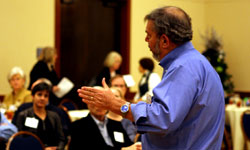 Lanny Gardner Lanny Gardner
For the very few people who may not know David Leach, you should know that he is the immediate past chairman of the ACGME, the organization that helps sets the standards and hold accountable the programs that train our physicians. In this role, he has been formidable in establishing competencies. He’s been a leader in this part of the world that we’re going to be talking about in the next couple of days.
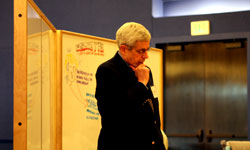 David Leach David Leach
You have to help me become a southerner. I’ve recently relocated to Soth Carolina and I’ve been a hardcore Yankee and need help in knowing how to be civil. (laugher)
Half of you are new and the others have varying levels of experience. I want everyone to presume and to know that you are welcome and to extend your hand to your neighbor and welcome them.
What was your day like today?
I got up in the wee hours and I’m sure your day was sort of like that. I watch people do cell phones and email and I think that this word, frenzy, captures how we spend our time and energy. I’d like to create a little space for us.
There is a pervasive form of modern violence to which the idealist...most easily succumbs: activism and over-work. The rush and pressure of modern life are a form, perhaps the most common form, of its innate violence.
To allow oneself to be carried away by a multitude of conflicting concerns, to surrender to too many demands, to commit oneself to too many projects, to want to help everyone in everything is to succumb to violence.
The frenzy of the activist neutralizes his (or her) work... It destroys the fruitfulness of his (or her)...work, because it kills the root of inner wisdom which makes work fruitful.
--Thomas Merton
This is a serious topic. We need the next couple of days to tap into our sources of wisdom and put the frenzy aside. Together there is tremendous widom here if we can access it. The trick is to get from frenzy to wisdom.
You’ve had an orientation session and you’ll hear more tomorrow about it. We’re not going to go into the history too much. The event that you’re at today has its roots in March 2005 when 45 people came together from 34 organizations. This was facilitated by the wonderful people who are helping us here. We created scenarios. What was remarkable is that people spoke from their hearts. They didn’t have official organizational opinions. They were attached to organizations and had enough authority within those organizations to continue the dialogue within them. The next session people started talking about portfolios and continuous learning systems.
You know the creation story but you may not know that after the sixth day when everything was done and God said “this is good”, an archangel went to God on the seventh day and asked Him how He knew this was good. God responded by saying, “You’ve disturbed my rest on the seventh day, so Lucifer go to hell.” (laughter)
There have been attempts at mission statements but nothing formal. There is nothing here but the relationships people have with each other. People are here to advocate for continuity and for physician competency.
I have hope and trust in this process.
"Hope is not the same as optimism. An optimist ignores the facts in order to come to a comforting conclusion. But a hopeful person faces the facts without blinking, and then looks behind them for potentials that have yet to emerge, knowing that the human experiment would never have advanced if it were not for the possibilities, however slim, that lie behind the facts."
I will not die an unlived life.
I will not live in fear
of falling or catching fire.
I choose to inhabit my days,
to allow my living to open me,
to make me less afraid,
more accessible,
to loosen my heart
until it becomes a wing,
a torch, a promise.
I choose to risk my significance;
to live so that which came to me as seed
goes to the next as blossom
and that which came to me as blossom,
goes on as fruit.
fully alive - dawna markova
The medical world is in your hands. In these meetings we’ve had ground rules:
- acknowledge that there will be tension in these discussions and that is good, because there can be growth with positive tension
- reflect on your own role in the system
- listen for value and with empathy to what other people say
- don’t have expectations, let things emerge at their own pace
- have patience with each other, and
- help each other succeed
I was raised in upstate New York near Lake Onodowohgah, which is said to be one of the birthplaces of the Iroquois nation. There is a story about how a young brave stood up in one of the meetings, which is something that hardly ever happens. He picked up one stick and broke it. He picked up five sticks and couldn’t break it. Then he sat down and they formed the Iroquois nations.
New York - 911. All the policemen, firemen and other emergency personnel have their own way of communicating. When the orders were to get the police out of the building, but there was no way to tell the firemen who were rushing into the buildings to get out because of their communications systems. Now from that experience, that is changing.
Did you know that we had about 16 types of intelligence agencies? We’re having to learn how to communicate better. We need to take responsibility for this. We need to step up to leadership to make this happen. We need creativity. We need to seek out different ideas and if we do that, we need to have a plan for conflict management.
We need a language of professionalism. The ACGME has language around competencies and it’s a wonderful language.
"Why does Torah tell us to 'place these words upon your hearts'? Why does it not tell us to place these holy words in our hearts'? The rebbe answers, "It is because as we are, our hearts are closed, and we cannot place the holy words in our hearts. So we place them on top of our hearts. And there they stay until, one day, the heart breaks and the words fall in."
There is a study by Robert Kegan about the stages of The Evolving Self. Kegan presents a model of psychological development consisting of six "equilibrium stages": the incorporative stage, the impulsive stage, the imperial stage, the interpersonal stage, the institutional stage, and the inter-individual stage. The object of each stage is the subject of the preceding stage.
For example, Harvard MBA types come in at stage 2 and die at stage 2. I imagine that most people here are at stage 4.
It’s best not to work against human nature. What we’re doing here is very aligned with what we program students to do.
We have to debunk the myth that our organizations are external to ourselves. “They” won’t let us do this. There is no “they”. We are the they. The dark sides of the institutions are reflections of my own shadow. If institutions are heedless of human suffering then I am heedless of human suffering. When you understand that you pay attention to your own heart.
“Power at its best is love implement the demands of justice, and justice at its best is power correcting everything that stands in the way of love.”
We can do this as a group of individual as we collaborate. A final note:
The Journey
One day you finally knew
what you had to do, and began,
though the voices around you
kept shouting
their bad advice --
though the whole house
began to tremble
and you felt the old tug
at your ankles.
"Mend my life!"
each voice cried.
But you didn't stop.
You knew what you had to do,
though the wind pried
with its stiff fingers
at the very foundations,
though their melancholy
was terrible.
It was already late
enough, and a wild night,
and the road full of fallen
branches and stones.
But little by little,
as you left their voices behind,
the stars began to burn
through the sheets of clouds,
and there was a new voice
which you slowly
recognized as your own,
that kept you company
as you strode deeper and deeper
into the world,
determined to do
the only thing you could do --
determined to save
the only life you could save.
~ Mary Oliver ~
She describes what we as physicians know what we have to do. It’s a scary thing to seek out your own voice, but if you do that then you see things in a more clear way than you could before.
We need community. Community leads to clarity. Clarity leads to courage.
Scribing
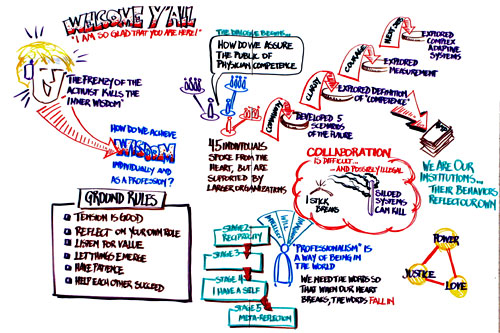
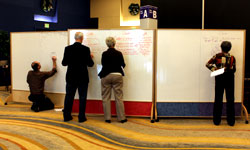 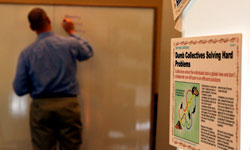
top of page |